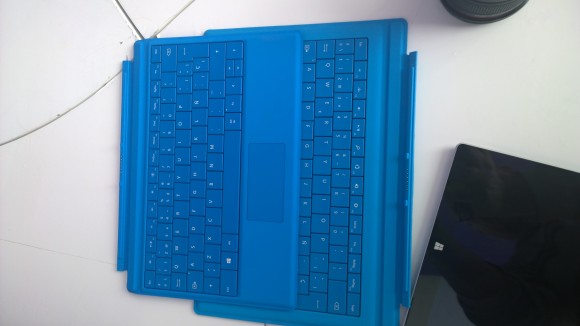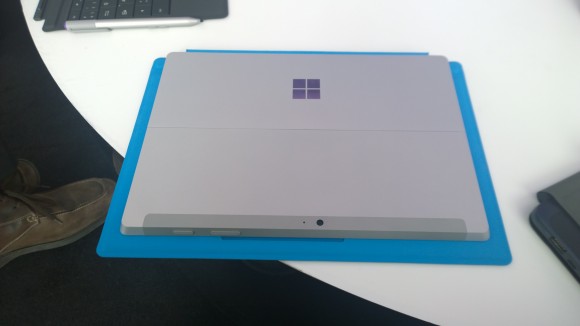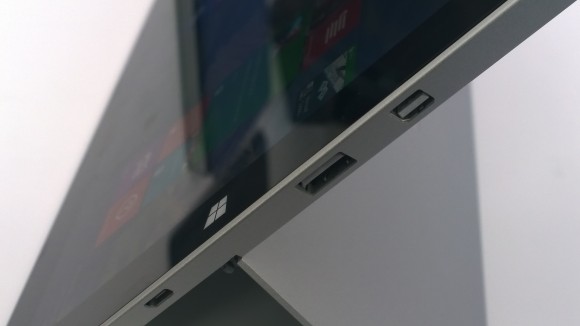I finally got my hands on a Surface 3. Here it is (red keyboard) beside my Surface Pro 3 (black keyboard) at the Microsoft Store.
image
Keyboard and Typing Experience
You’ll notice that the actual keys on the keyboard appear to be the same size. The difference in width is in the border on the sides of the keys. That border is much slimmer on the Surface 3 keyboard. The Trackpad is about the same width, but not as tall. They trimmed some of the border between the top row of keys and the screen. Overall the typing experience seemed comparable to what you get with the Surface Pro 3 keyboard, and I like that.
Screen
As you can see the Surface 3 screen is nice and bright. I set both machines to Show more tiles on the Start screen. On the Surface 3 you get five rows of medium sized tiles. On the Surface Pro 3 you get six. At a glance the tiles look to be about the same size so if you can read the tiles on the Surface Pro 3, you’ll be fine with the Surface 3. I looked at several of the applications that I use daily and found that the Surface 3 is just as easy to read and work with as the Surface Pro 3. There’s just less to see on the screen, about 11% less. If you are routinely working at the edges of the screen of a Surface Pro 3 you might miss that extra content. But otherwise, you probably won’t.
If you are used to working at a 16:9 aspect ratio [1920 x 1080], the switch to the 3:2 aspect ratio [1920 x 1280] on the Surface 3 will give you 200 pixels more vertical space in which to work. This is a really noticeable difference and it’s a nice change.
Kick Stand
The three position kickstand gives you three very usable viewing angles. I would have preferred that the lowest of these was a little lower, but that’s because I do a lot of work with the Pen on my Surface Pro 3. Still I could see using all three positions and getting lots of productive work done. The lowest setting would be great at a conference where you don’t want your device to be upright like a barrier between you and the other people at the table.
Weight
The Surface 3 is just 1.37 pounds (622 grams). My most demanding application for it will be standing and walking and talking with it. I’ll be using the pen and not the keyboard. I do that now with my Surface Pro 3 and it’s great but from what I could tell, I’m going to really enjoy the Surface 3. It is 6.25 ounces (176 grams) lighter than the Surface Pro 3. That’s a noticeable difference, and I was glad to shed the weight.
Pen Experience
The Surface Team did a great job of carrying the Pen experience from the Surface Pro 3 to the Surface 3. I use OneNote a lot for cursive notes and this wall worked fine. There wasn’t time to test this with drawing applications though, but from what I saw, the experience should be similar.
Performance
I wasn’t expecting great performance with the Quad-core Intel Atom x7-Z8700 processor. I was very pleasantly surprised to find that the Surface 3 demo units with the modest 2 gigabytes of RAM were snappy and responsive. I tried watching some video over the net at full screen. This was really good, and I didn’t notice any lag or hesitation for any of the kinds of things I would do for casual or business use. I didn’t try any video editing or heavy duty graphics, but that’s not what this machine is designed to do.
Wireless Display Adapter
This is almost an after-thought for me, but I noticed and played with the Surface 3 connected to a gigantic monitor using the Microsoft Digital Display. This was a snap to connect and worked very well. I’ll be writing more about that in a few days.
Check out these great opportunities.
Azure Free Trial
MSDN Azure benefit
CANITPRO at the Movies (English)
CANITPRO at the Movies (French)











